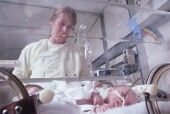Report on Infant Heart Transplants Sparks Debate
A Brief Report by Mark M. Boucek, M.D., and colleagues from the Denver Children's Hospital Pediatric Heart Transplant Team published in the Aug. 14 issue of the New England Journal of Medicine is the basis for an extended discussion of the ethics of organ procurement in three accompanying Perspective articles, an editorial, and an online roundtable discussion.

WEDNESDAY, Aug. 13 (HealthDay News) -- A Brief Report by Mark M. Boucek, M.D., and colleagues from the Denver Children's Hospital Pediatric Heart Transplant Team published in the Aug. 14 issue of the New England Journal of Medicine is the basis for an extended discussion of the ethics of organ procurement in three accompanying Perspective articles, an editorial, and an online roundtable discussion.
In their report, Boucek and colleagues discuss how they successfully transplanted three hearts from infant donors who had died from cardiocirculatory causes. Because infants awaiting a heart transplant have a significantly increased risk of death compared to adults, they conclude that such donors represent a life-saving opportunity. In one Perspective article, Robert Veatch, Ph.D., of the Kennedy Institute of Ethics, Georgetown University in Washington, D.C., said that the criterion for cardiac death had not been met since it would not have been possible to restart the three donor hearts in the recipients after transplantation if there had been irreversible cessation of cardiac function.
In a second Perspective article, James Bernat, M.D., of the Dartmouth Medical School in Hanover, N.H., said that Boucek and colleagues' tested the permissible boundaries of organ procurement, and argued that the 75-second interval they used in their investigational protocol will be deemed unacceptable by the medical community. In a third Perspective article, Robert Truog, M.D., of the Harvard Medical School and Children's Hospital Boston, and Franklin G. Miller, Ph.D., of the National Institutes of Health in Bethesda, Md., argued for a reassessment of the dead donor rule -- which holds that organ donors must be declared dead on the basis of either brain-death criteria (i.e., irreversible cessation of all brain functions) or cardiac-death criteria (i.e., irreversible cessation of cardiocirculatory function) -- and stated that the criteria for organ donation should be based on valid informed consent under the limited conditions of devastating neurologic injury.
"The opinions of each of these experts are controversial and may be challenged," state the authors of an accompanying editorial. "We hope that the articles and roundtable discussion will stimulate debate on organ donation in infants and lead to a consensus that not only meets a high ethical standard but also addresses the urgent shortage of donor organs. The development of standard criteria for pediatric heart donation is a vital goal. In the report by Boucek et al., one conclusion is clear. As a result of their investigational protocol, three babies are now alive; had the procedures not been performed, it is virtually certain that all six babies would be dead."
Full Text - Boucek Full Text - VeatchFull Text - BernatFull Text - TruogEditorial
Copyright © 2008 ScoutNews, LLC. All rights reserved.